In 2012, I read 27 books. Here they are in order from least to most inspiration, pleasure, ideas and word-love I derived from them. This is the bottom of the list, top picks to come!
(19) How Fiction Works (2008) – James Wood
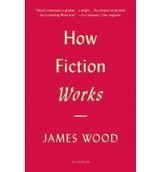 Coherent, snappy, reader-friendly literary criticism: aaah, sweet relief. James Wood, I will always love you for brilliantly taking down Paul Auster and Michel Houellebecq as overrated in the pages of The New Yorker, no less. Though minus point for how little of an impact this treatise ultimately made on me. (I realize this could also be because the internet has rotted my brain.) The only thing I can recall several months after reading it is that it convinced me to read more Saul Bellow. I guess that could be counted as a success.
Coherent, snappy, reader-friendly literary criticism: aaah, sweet relief. James Wood, I will always love you for brilliantly taking down Paul Auster and Michel Houellebecq as overrated in the pages of The New Yorker, no less. Though minus point for how little of an impact this treatise ultimately made on me. (I realize this could also be because the internet has rotted my brain.) The only thing I can recall several months after reading it is that it convinced me to read more Saul Bellow. I guess that could be counted as a success.
(20) Bright Lights, Big City (1984) – Jay McInerney
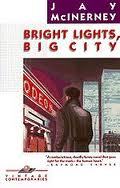
Fluffier than I expected, though some parts definitely made me laugh. Reminded me ofJonathan Ames (The Extra Man), except that I enjoyed Ames much more: more meat, more heft, more risks, more heart. Not convinced the second-person narrative did anything that first-person narrative can’t do.
(21) Is Everyone Hanging Out Without Me? (And Other Concerns) (2011) – Mindy 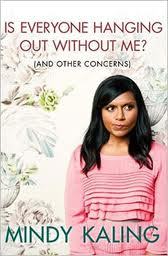 Kaling
Kaling
Some funny stuff, though not recommended if you aren’t prepared to deal with her self-obsessed persona. I would skip the accounts of her childhood (not so interesting & not good writing), but enjoyed her take on show business, early years in NYC, etc.
(22) Reading Lolita in Tehran (2003) – Azar Nafisi
My favourite parts were when Nafisi was writing as literature professor – intriguing 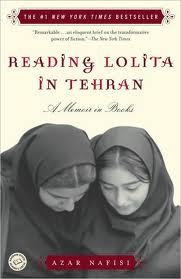 interpretations of The Great Gatsby, Daisy Miller & Lolita, and their bearing on her and her students’ lives in Iran. I also learned about Iranian history, a fascinating, nightmarish personal account, the upheaval that has occurred in the past 40 years. The style was a bit formulaic sometimes (as in “I can feel the snow of Tehran as I write, I can see my students’ faces as I type these words”) & I started to get all of the characters mixed up, felt like they weren’t drawn distinctly enough, so I wasn’t emotionally drawn in.
interpretations of The Great Gatsby, Daisy Miller & Lolita, and their bearing on her and her students’ lives in Iran. I also learned about Iranian history, a fascinating, nightmarish personal account, the upheaval that has occurred in the past 40 years. The style was a bit formulaic sometimes (as in “I can feel the snow of Tehran as I write, I can see my students’ faces as I type these words”) & I started to get all of the characters mixed up, felt like they weren’t drawn distinctly enough, so I wasn’t emotionally drawn in.
(23) In a Perfect World (2009) – Laura Kasischke
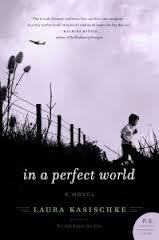 Speculative fiction about a plague, but told from an oblique perspective – that of a slightly depressed, newly married flight attendant forced into mothering her evil stepchildren in a midwest backwater. Wonderful creepy details about how American society deals with the plague (obsessive reporting on celebrity deaths, white helium balloons are anonymously released in memory of victims). Also a dark fairytale quality to it, atmospheric.
Speculative fiction about a plague, but told from an oblique perspective – that of a slightly depressed, newly married flight attendant forced into mothering her evil stepchildren in a midwest backwater. Wonderful creepy details about how American society deals with the plague (obsessive reporting on celebrity deaths, white helium balloons are anonymously released in memory of victims). Also a dark fairytale quality to it, atmospheric.
However, the heroine’s passivity drove me crazy. There are at least five scenes in which someone says or does something awful to her & she’s too stupefied to react… Ultimately it feels like a problem with the mechanics of the book rather than an active choice made by the author.
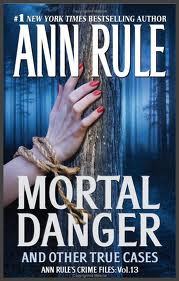 (24) Mortal Danger (2008) – Anne Rule
(24) Mortal Danger (2008) – Anne Rule
Trashy true crime book, provides all the dirty details of real-life murder cases. (I’m including ALL of the books I read in this list!) The first case is actually a prettyinteresting account of how a relationship can become abusive over time & a woman who never imagined herself as “one of those women” finds herself trapped.
(25) The English Patient (1992) – Michael Ondaatje
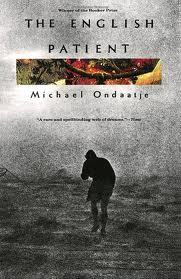
This was a bit force-fed (force-read) for me. The only book I had to read on a long plane ride to the Middle East. I felt a bit like Elaine in that one Seinfeld episode. Many lyrical, lovely quotable passages, Ondaatje is clearly a poet, but on the whole I resisted entering this world because it felt so contrived, precious. (For example, the author kept mentioning the characters were in a collapsing Italian villa, through various romantic iterations; proof of passion is a woman stabbing a man with a fork, cracking a plate on his head. But in a way, it’s supposed to make you feel there’s real passion, real magic you don’t have access to.)
(26) Henry and June (1986) – Anaïs Nin
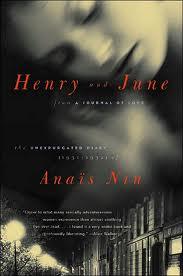 Completely disappointing and actually a little boring after reading Anaïs Nin’s rich, witty, philosophical & idea-packed diaries. This book contains only extractions from her diary that deal with her affair with Henry Miller. Consequently, it’s repetitive and a one-sided vision of a deep-thinking woman- makes her seem singularly obsessed with the affair & its sexual aspects, when there was so much else going on, including within their affair (talks about writing, aesthetics, etc.). If you’re interested in it for the sexy bits, go straight to her erotica (Delta of Venus & Little Birds).
Completely disappointing and actually a little boring after reading Anaïs Nin’s rich, witty, philosophical & idea-packed diaries. This book contains only extractions from her diary that deal with her affair with Henry Miller. Consequently, it’s repetitive and a one-sided vision of a deep-thinking woman- makes her seem singularly obsessed with the affair & its sexual aspects, when there was so much else going on, including within their affair (talks about writing, aesthetics, etc.). If you’re interested in it for the sexy bits, go straight to her erotica (Delta of Venus & Little Birds).
(27) Anais Nin: A Biography (1995) – Deirdre Bair
Read this after much hesitation, but my 2012 obsession with Anais Nin eventually forced my hand. I didn’t trust Bair as a biographer after reading her book on Simone de Beauvoir. Although she writes that she has thought a great deal about remaining  impartial as a biographer there are loads of value judgments in both biographies. It’s not that I needed her to like Nin. It’s that she writes with an active distaste for her subject. No further evidence is needed than her chapter dealing with Nin’s illness and death. While she sums up years-long relationships, books Nin wrote, and other important events in a a paragraph or so, she spends several pages on Nin’s cancer, beginning with the sentence, “The cancer started in the vagina” and details her extensive, years-long suffering. This to me was a passive-aggressive way to mete out justice for Nin’s very active and complicate sex life. No thoughtful assessment of Nin’s complicated relationship with the women’s liberation movement, no real assessment or even description Nin’s life work, least of all the diaries (only details about how she screwed over her loyal publisher for their publication & conspired to get them published by any means possible). No thoughts about what it meant to be a woman writer in her time or even the boldness with which she lived out her sexuality as a woman in a repressive time.
impartial as a biographer there are loads of value judgments in both biographies. It’s not that I needed her to like Nin. It’s that she writes with an active distaste for her subject. No further evidence is needed than her chapter dealing with Nin’s illness and death. While she sums up years-long relationships, books Nin wrote, and other important events in a a paragraph or so, she spends several pages on Nin’s cancer, beginning with the sentence, “The cancer started in the vagina” and details her extensive, years-long suffering. This to me was a passive-aggressive way to mete out justice for Nin’s very active and complicate sex life. No thoughtful assessment of Nin’s complicated relationship with the women’s liberation movement, no real assessment or even description Nin’s life work, least of all the diaries (only details about how she screwed over her loyal publisher for their publication & conspired to get them published by any means possible). No thoughts about what it meant to be a woman writer in her time or even the boldness with which she lived out her sexuality as a woman in a repressive time.
Blargh. I hated it. Only useful to gain some details about who some of the people in the diaries are, in particular her husband & their unusual lifelong relationship (completely omitted from the published diaries).
Books abandoned in 2012:
Time and Again (1970) – Jack Finney
I’ve had several people tell me this gives a vivid account of New York City in the early 20th century, but the writing style was so flat! It’s supposed to be light reading, too… Second time I’ve tried to read this, can’t say I didn’t try.
Murphy – Samuel Beckett
Who brings an experimental depressing Beckett novel to the beach? Not sure when the right time to read this would be, but beachside in August is not it…
Incest – Anais Nin
The second “unexpergated” volume of her diaries, after Henry & June, published by her husband after she died. Again, disappointing after reading the versions she edited & published in her time. Only the personal life is here, so she comes off as rambling, obsessive, shallow (whereas the 1960s diaries reveal a rich inner life). Couldn’t finish it.
